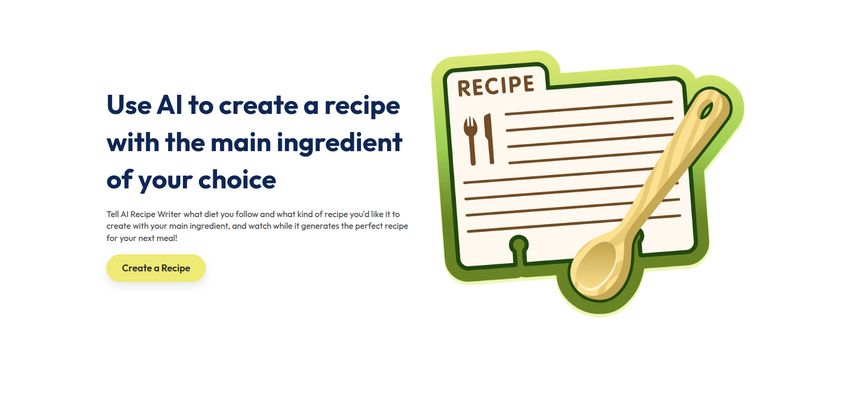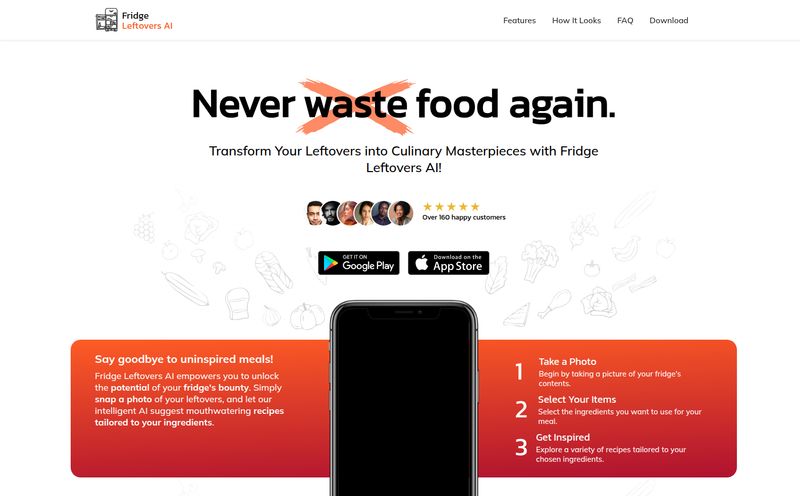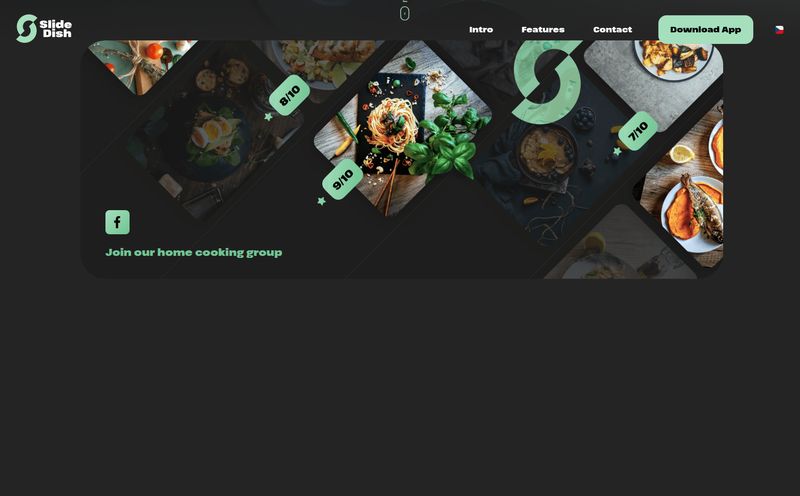It’s 6 PM. You’re staring into the fridge. There’s a single chicken breast, half a bell pepper, a sad-looking zucchini, and a vague sense of dread. We’ve all been there. It’s that daily moment of culinary paralysis where you either order takeout for the third time this week or resign yourself to another boring meal of… well, pan-fried chicken breast with a side of existential angst.
For years, I've preached about keyword research and traffic funnels, but my own dinner funnel was seriously broken. Then, in the midst of the great AI boom we're all living through, I stumbled upon a tool that promised a different way: the AI Recipe Writer. The premise is simple, almost deceptively so. You tell it what you have, what you need (or don't need, in the case of diets), and it whips up a recipe. But as we know in the tech world, simple ideas can be the most powerful. Or the most flawed. I had to find out.
So, What Exactly Is This AI Recipe Writer?
At its core, AI Recipe Writer is your digital sous-chef. It’s a straightforward web tool designed to combat food waste and culinary boredom. You plug in a main ingredient—that lonely chicken breast, for instance—then add your dietary preferences like gluten-free, vegan, or low-carb. You can even specify the type of meal you're in the mood for, like a quick lunch, a hearty dinner, or even a snack. Hit the button, and the AI model on the back end gets to work, generating a custom-made recipe just for you. No more endless scrolling through food blogs (ironic, I know) to find a recipe that almost fits what you have.

Visit AI Recipe Writer
Putting the AI Chef to the Test: My First Foray
Theory is great, but execution is everything. So, I decided to give it a real-world test drive with the contents of my own slightly-less-than-inspired fridge. My challenge: a couple of sweet potatoes, a can of black beans, and a desire for something vaguely healthy and definitely not boring. I plugged in "sweet potatoes" as the main ingredient, selected "vegetarian" for the diet, and chose "dinner" as the meal type.
In less time than it takes to preheat my oven, it spat out a recipe for “Spicy Black Bean Stuffed Sweet Potatoes with an Avocado-Lime Crema.” Not bad. Not bad at all. The ingredients list was reasonable, and the instructions were clear and sequential. It was a genuinely solid idea I probably wouldn't have come up with on my own, at least not on a Tuesday night.
The Good Stuff: What I Really Liked
No More Ingredient Purgatory
My biggest win? This thing is a champion at fighting what I call 'ingredient purgatory.' You know, that one leek you bought for a soup recipe last week, now wilting in the crisper drawer. AI Recipe Writer gives those forgotten items a new purpose. It’s a fantastic tool for reducing food waste and making you feel like a resourceful, on-the-ball home cook. It’s turned my “what do I do with this?” moments into “ooh, I can make that” moments.
A Playground for Dietary Needs
I’ve always struggled to cook for friends with different dietary needs. My buddy who's gone full keto, my cousin who is celiac… it's a mental load. This tool makes it so much easier. Being able to just plug in “salmon” and “keto” and get a handful of decent ideas is a game-changer for hosting. It removes the guesswork and the frantic Googling. It’s not just about restrictions either; it's about exploration. Want to try a week of plant-based meals? Here's your starting point.
Instant Inspiration on Tap
Sometimes, you just get stuck in a rut. For me, it’s tacos. If I don't plan, we're having tacos. This AI tool is like a little electric shock to your culinary creativity. Even if you don’t follow the recipe to the letter, it gives you a foundation, a new direction. It’s the brainstorming partner who never gets tired of your weird ideas.
A Pinch of Salt: Where It Could Improve
Of course, no tool is perfect. And this AI is no Gordon Ramsay… yet. It has its quirks, and it’s important to go in with your eyes open.
Remember GIGO: Garbage In, Garbage Out
The AI is smart, but it’s not a mind reader. The quality of your recipe is directly tied to the quality of your input. If you just type “chicken,” you’ll get a generic chicken recipe. But if you type “chicken thighs, mushrooms, and thyme,” you'll get something much more tailored and interesting. You have to give it something to work with. It's a creative partner, not a magician.
The AI’s ‘Creative License’
Sometimes, the AI gets a little… ambitious. A recipe it generated for me once called for a very specific, and expensive, type of artisanal cheese that I defintely did not have. You have to use your human judgment. Think of the generated recipes as a strong first draft, not a sacred text. You might need to swap an ingredient, adjust a cooking time, or add a little more spice. A human touch is still required.
The Mystery Box AI Model
As a tech guy, I'm always curious about what's under the hood. The site doesn’t give much information about the AI model it’s using. Is it a fine-tuned version of GPT-3.5? GPT-4? A proprietary model? This lack of transparency isn’t a dealbreaker for the average user, but it leaves me with questions about its training data and capabilities. It’s a minor point, but one that tech enthusiasts might notice.
What's the Damage? A Look at the Price
This is often the part of the review where I break down pricing tiers and tell you if the pro plan is worth it. But here's the kicker: AI Recipe Writer appears to be completely free right now.
I did some digging, and the 'Pricing' link on their site actually leads to a 404 error page. Interestingly, the error page mentions 'Bubble Pro,' which tells me the site was built on the no-code platform Bubble. This is pretty cool, as it shows how quickly powerful tools can be spun up these days. It also suggests the project might be in an early stage, with the creator focusing on functionality before monetization. So my advice? Get in and use it now while it costs nothing.
Is an AI Recipe Generator Actually for You?
So, who should be using this? I see a few key groups:
- The Busy Professional or Parent: If meal fatigue is real and you just need a quick, decent idea without the fuss, this is your new best friend.
- The Budget-Conscious Cook: Perfect for building a meal around what’s on sale at the grocery store or what’s already in your pantry.
- The Adventurous Eater: If you want to break out of your comfort zone and try new flavor combinations, this is a great, low-risk way to do it.
- The Health-Focused Individual: Anyone managing a specific diet or allergy will find this incredibly helpful for creating variety in their meals.
Frequently Asked Questions
Is AI Recipe Writer really free to use?
As of right now, yes! I couldn't find any pricing information, and the tool is fully accessible without a paywall or subscription. This could change in the future, of course, but for now, you can generate recipes for free.
How accurate are the recipes?
They are surprisingly accurate and well-structured. However, think of them as a strong starting point. You may need to apply your own cooking knowledge to adjust seasoning, substitute a niche ingredient, or tweak the cooking times based on your specific oven or stove.
What kinds of diets and restrictions can it handle?
It covers a wide range of common dietary needs, including vegetarian, vegan, gluten-free, keto, and paleo. You simply select your preference from a dropdown menu before generating the recipe.
Can I use more than one main ingredient?
The current interface is designed around a single 'main ingredient' field. For best results, I'd suggest picking the primary protein or vegetable you want to feature. You can often work other ingredients you have into the resulting recipe framework.
Does the tool save the recipes I create?
There doesn't appear to be a feature for creating an account or saving recipes within the tool itself. My workaround is simple: I just copy and paste the ones I like into a notes app or a Google Doc for later. Easy peasy.
My Final Verdict
Look, the AI Recipe Writer isn't going to replace the intuition and love that goes into a family recipe passed down through generations. It's not going to earn a Michelin star. But that's not its purpose. Its purpose is to be a genuinely useful, creative, and fast assistant in the kitchen. It solves a real, everyday problem with a dash of modern tech magic.
It’s a fantastic example of how AI can be applied in practical ways to make our daily lives just a little bit easier and more delicious. It’s fun, it’s free, and it once saved my sweet potatoes from a bland, boring fate. For me, that’s a clear win. Give it a try next time you're staring blankly into your fridge; you might be surprised what you and your new robot sous-chef cook up.



